NABJ, NAHJ Had Praised Company for Diversity
In K.C., Black Journalist’s Voice Becomes the Paper’s
Fox Defamation Case Has Venezuelan Connection
Jim Trotter Joining The Athletic
McCarter Named Interim Top Editor at USA Today
Hair to Head Byron Allen’s TV Station Division
Marginalized Groups See ‘Palpable Harm’ by Media
Warnings on Abuse of Child Migrants Ignored
A.P. Reporting Traces Africans From Hope to Death
Spanish Speakers Victimized by Faulty Translations
Juadine Henderson Dies; SNCC Worker, Journalist
Short Takes: Media diversity reports; Buffalo News; inadequate funding for BIOPIC media; covering violence and police; “PBS NewsHour” tone change; audio discussion of lynching Black people and killing journalists; Juan Williams and Clarence Thomas; Jamila Bey; media and underreporting of COVID; “inside the Klan” documentary; cartoonist Jerry Craft; ABC News anchor in South Sudan; Black viewers and streaming; journalists finish slain colleagues’ work.
Homepage photo: BuzzFeed media brands
Support Journal-ismsDonations are tax-deductible.
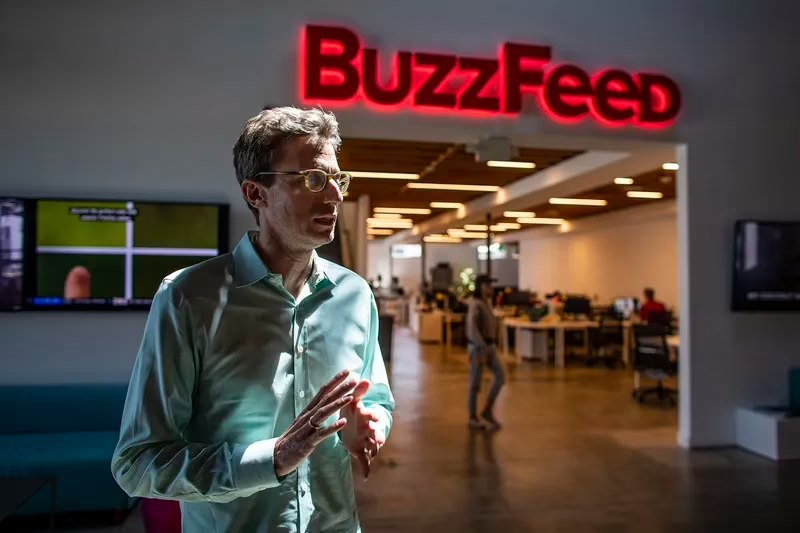
NABJ, NAHJ Had Praised Company for Diversity
BuzzFeed is shutting down its namesake news division, which won acclaim for its journalism and for its diversity but “fell prey to the punishing economics of digital publishing that has laid low many of its peers,” Benjamin Mullin and Katie Robertson reported Thursday for The New York Times.
Jonah Peretti, BuzzFeed’s chief executive, said in an email to employees on Thursday that he was closing BuzzFeed News as part of a broader round of cuts at the company. About 60 people will be affected by the shuttering of the news division, some of whom will be offered jobs at other parts of the company.
Under founding editor Ben Smith, BuzzFeed was cited by the National Association of Black Journalists in 2015 and National Association of Hispanic Journalists in 2014 for its steps to improve diversity.
“While BuzzFeed has not yet reached its goal of having a staff with diversity that reflects its readership, they are to be commended for publicly valuing the importance of this goal, and for leading the way among digital outlets in taking seriously the need to expand the pipeline necessary to create such a newsroom,” Errin Haines, then NABJ’s vice president-print, said at the time. ‘Their leadership has been a catalyst in diversity hiring in digital media, and NABJ is excited to celebrate and encourage that.” BuzzFeed won NABJ’s “Best Practices” Award.
Adrian Carrasquillo accepted a media award for BuzzFeed at NAHJ’s 2014 convention. Carrasquillo said then that the site had grown from having two people with an interest in Latino coverage when he was hired the previous June to having a dozen. “We are breaking stories in the space,” he said, adding that the pieces are integrated into the rest of the site.
For some, working at BuzzFeed came with awe-inspiring moments.
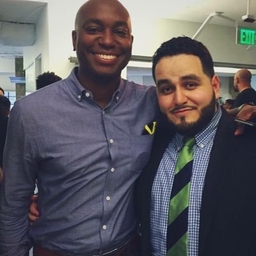 “I remember one day during maybe the 2018 midterms or right after, walking into work amid the swirl of trying to report and navigate how to live in New York City and report on national politics while working at its headquarters near Union Square in Manhattan,” Darren Sands (pictured, with Adrian Carrasquillo), who worked there from 2014 until 2020, messaged Journal-isms.
“I remember one day during maybe the 2018 midterms or right after, walking into work amid the swirl of trying to report and navigate how to live in New York City and report on national politics while working at its headquarters near Union Square in Manhattan,” Darren Sands (pictured, with Adrian Carrasquillo), who worked there from 2014 until 2020, messaged Journal-isms.
“I was covering Georgia and Florida and it was exhilarating, but difficult and challenging. It was a busy weekday with lots of activity, and I remember looking up as I reached into my wallet to find my key fob to get into the building when I locked eyes with Kelly Rowland. We shared a warm glance — she seemed to grin at the brief glimpse of my surprise my spotting her on another ordinary day…and I was truly shocked that this journey had now allowed me meet a second member of Destiny’s Child!
“Meeting Beyoncé was a story within itself. I’ll never forget the ride and I’m sorry for the 180 journalists have to face this news today.”
In its latest diversity report, released in January 2022, current CEO Peretti wrote, “Through widespread, concerted efforts we’ve been able to make our organization more racially diverse (50.62% white in 2021; down from 74.8% white in 2014). Sharing this data allows us to note our progress, while holding ourselves accountable around areas that require additional focus.”
Rob Tornoe wrote of Thursday’s developments in the Philadelphia Inquirer, “Peretti said he was slow to accept that platforms such as Facebook and Twitter would provide the distribution to support “premium, free journalism purpose-built for social media.”
“ ‘I made the decision to overinvest in BuzzFeed News because I love the work and mission so much,’ Peretti wrote.
“BuzzFeed purchased HuffPost from Verizon in 2020, and Peretti said there would be jobs available there for some of the news reporters impacted by the closure. . . .
“ ‘We will concentrate our news efforts in HuffPost,’ Peretti wrote in the memo.
Mullin and Robinson continued, “BuzzFeed’s decision is the latest in a series of financial setbacks faced by digital media companies. Once the focus of enormous optimism and investment from industry titans including Disney and Comcast, new-media firms like BuzzFeed, Vox Media and Vice have failed to live up to their formerly lofty valuations.
“The media industry writ large has pivoted to focus on streaming, and digital advertising — a mainstay for digital publishing companies — is increasingly going to tech platforms such as Instagram and TikTok. . . .
“The site won a Pulitzer Prize in 2021 for international reporting for stories that used satellite imagery to report on the Chinese government’s detention of Muslims.
“BuzzFeed News won plaudits for its investigative work, becoming a finalist for the Pulitzer Prize in 2017 for an exposé into a corporate dispute-settlement process, but it was also criticized for ignoring some of the norms followed by some of its more traditional competitors.
“In 2017, BuzzFeed published a dossier full of unverified information about Donald J. Trump, who had just been elected president. . . .”
- Ben Smith, Semafor: The end of the BuzzFeed era in news
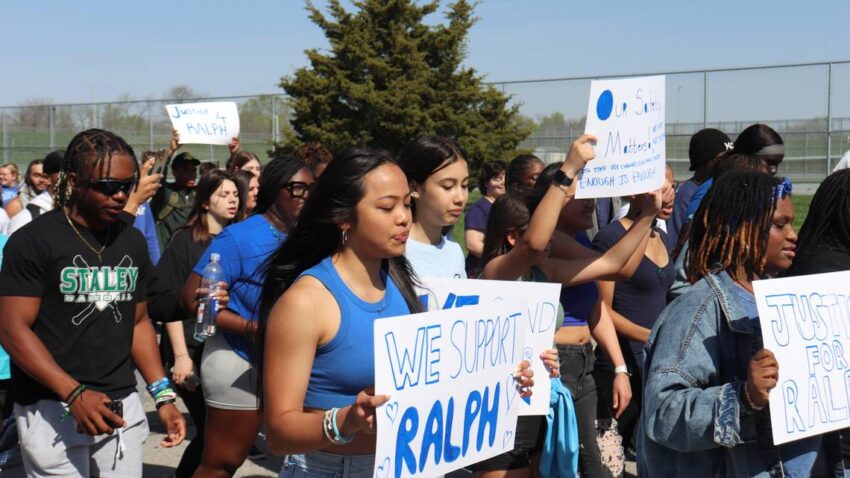
In K.C., Black Journalist’s Voice Becomes the Paper’s
With uncompromising language, the Kansas City Star’s editorial board has put the newspaper squarely in the forefront of the outrage over the shooting of Ralph Yarl, the Black 16-year-old wounded while trying to pick up his younger siblings. He had gone to a house with an address similar to the one he sought.
The editorial questioned the release of Andrew D. Lester, the 84-year-old white man accused in the shooting, who was able to quickly post bond and go about his life.
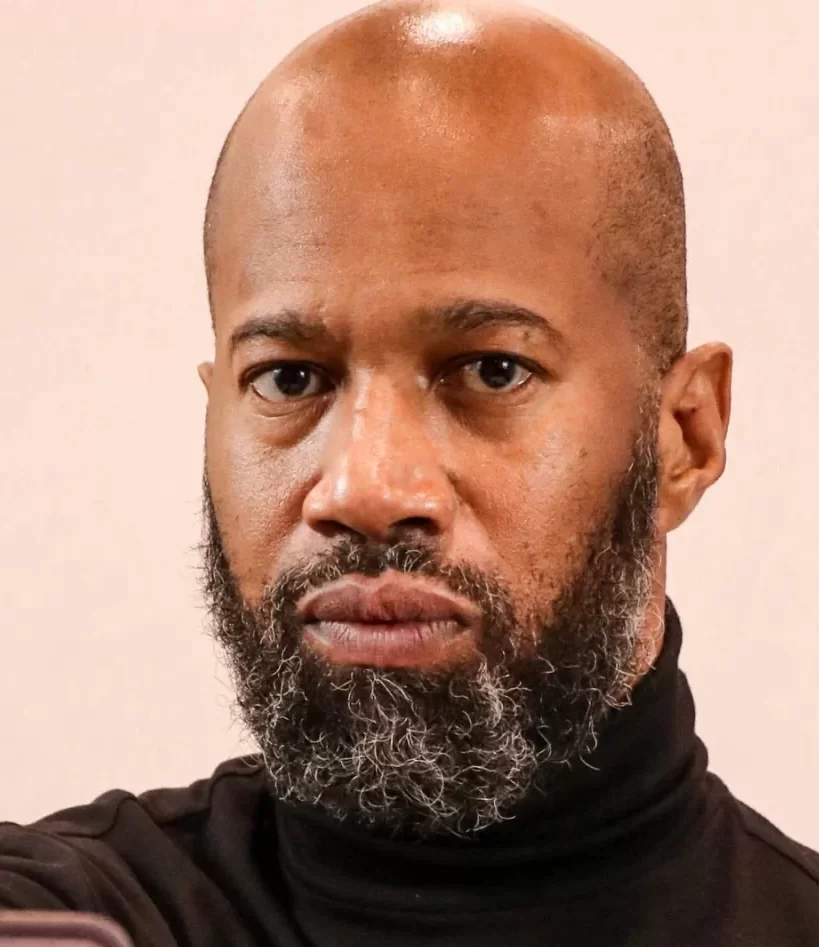 The editorial Monday was written by Toriano Porter (pictured), a Black journalist who also writes a column for the Star, and, for some of this year was its only editorial writer. Thus, for a time, Porter wrote all of the opinion pieces speaking for the newspaper.
The editorial Monday was written by Toriano Porter (pictured), a Black journalist who also writes a column for the Star, and, for some of this year was its only editorial writer. Thus, for a time, Porter wrote all of the opinion pieces speaking for the newspaper.
Porter, 48, told Journal-isms Wednesday that he knew that no Black person would be released as quickly as Lester was. The incident took place on Thursday, and by Friday and Saturday, community members “were inboxing and calling me, asking ‘what are you going to write about this?” Porter called the outreach the result of “doing that reporting from the ground. You build sources, you build trust.”
 Today, Porter is joined on the editorial board by Melinda Henneberger (pictured), who returned to the newspaper in the last few days after a stint at the Sacramento Bee and winning the Pulitzer Prize for commentary last year, and “Letters to the Editor” overseer Derek Donovan. Henneberger already has an opinion about Missouri Republican Gov. Mike Parson’s statement Wednesday accusing President Biden of politicizing the tragedy. “If Missouri’s governor really thinks people are in the streets because of anything Joe Biden said, then that just proves how little he knows about his own constituents,” she messaged Journal-isms.
Today, Porter is joined on the editorial board by Melinda Henneberger (pictured), who returned to the newspaper in the last few days after a stint at the Sacramento Bee and winning the Pulitzer Prize for commentary last year, and “Letters to the Editor” overseer Derek Donovan. Henneberger already has an opinion about Missouri Republican Gov. Mike Parson’s statement Wednesday accusing President Biden of politicizing the tragedy. “If Missouri’s governor really thinks people are in the streets because of anything Joe Biden said, then that just proves how little he knows about his own constituents,” she messaged Journal-isms.
“I started this week remotely and my first column runs tomorrow, but I will be there physically in another week. . . . I’ll be coming back as the paper’s metro columnist and a member of the editorial board.”
The editorial, updated Tuesday, is behind a paywall, but was picked up by Yahoo. It begins:
“After being shot two times, once in the head, teenage Kansas City shooting victim Ralph Yarl is at home and recovering. For that, we should be thankful above all. The man who allegedly shot the 16-year-old Staley High School student was taken into custody for 24 hours following the assault, but released. Until Kansas City Police Department investigators present a case file to Clay County Prosecutor Zachary Thompson, the man will remain free, Thompson told us Monday.
“Thompson let us know he will be on the case — as soon as he is presented one by police. We will see if he handles this case in a fair and impartial manner.
“Forget the excuses offered up by new Kansas City Police Chief Stacey Graves. Her explanations about the shooting and why the man wasn’t arrested don’t add up. And the longer authorities play coy about why the alleged shooter is free, the situation could worsen. For a case file to be completed and submitted to prosecutors, law enforcement officials need a formal victim statement, forensic evidence and other information, the chief said. Because of Ralph’s condition, police weren’t able to talk to him about the shooting before Monday, they claim.
“Why would police need a victim statement? What if Ralph had died, or was further incapacitated and unable to communicate? A firearm the man allegedly used was recovered, police said.
“Kansas City’s relationship with its police department needs healing. Law enforcement seeming to slow-walk the investigation of a man who allegedly shot an innocent Black child does little to repair an already tenuous partnership.
“Ralph was shot for ringing the wrong doorbell, according to his family. And the shooter wasn’t immediately charged with a crime? That is almost unheard of. No wonder the story is blowing up in social media. Now, the international spotlight is on our city — for all the wrong reasons.
“Police have not suggested that the family’s version of what occurred in the 1100 block of 115th Street in the Northland isn’t true.
“We question why it took Graves and Kansas City Mayor Quinton Lucas three days to address the shooting and its aftermath. . . .
Sky News reports on the incident. Ralph Yarl was shot in the head and arm when he accidentally tried to collect his brothers from the wrong house, and had to ask at three houses for help before he was found, with a neighbour jumping over his fence to try to save him. (Credit: YouTube)
“Activists and community leaders are outraged, as they should be. How could a man shoot a child for mistakenly ringing his doorbell and not face immediate legal ramifications? Prosecutors build cases as more evidence becomes available. That should not preclude or delay charges. Why wait?
“Waiting on the victim to speak to police before making an arrest is not how the criminal justice system works, said Natasha Scruggs, a Kansas City criminal defense attorney with no ties to the case. ‘Probable cause is all you need,’ Scruggs told us. ‘Even if it isn’t attempted murder, there is plenty of probable cause in this case that a crime occurred.’
“The public has a right to know if investigators gave the alleged shooter a pass because he is elderly and white, as activists and civil rights attorneys such as Lee Merritt and Ben Crump suggest?
“Police have not identified the shooter’s ethnicity, but property records indicate the homeowner is white, The Star reports. Race, in this case, cannot be ignored.
“For decades, this police department has routinely disregarded Black lives and driven a chasm between the agency and the Black community. In a time when accountability is needed more than ever, Graves had an opportunity to make a solid first impression as a new chief.
“Instead, the public was fed excuses.
“Celebrities Halle Berry and Viola Davis have highlighted the shooting, as have other Hollywood stars such as Jennifer Hudson. The NFL Draft is set to begin soon, and now we have reason to worry this injustice will upstage what should be a celebration for Kansas City.
“ ‘I was a Ralph. We were all Ralph,’ The Roots’ Questlove wrote on Facebook Sunday. The music producer and musician spoke for us all.
“Later Sunday, hundreds of protesters marched through the Clay County neighborhood where the shooting took place. The shooting wasn’t justified, activists said. If we believe the family — and we see no reason not to — the alleged shooter wasn’t even close to qualifying for self-defense under Missouri’s misguided ‘Stand Your Ground’ law. Ralph is a child. A kid was shot twice by a gun-wielding homeowner. And as of Monday, the man had not been held to account for his actions. Is that justice? We think not.”
- Jarvis DeBerry, MSNBC: Ralph Yarl is yet another Black victim of America’s ‘shoot first’ mentality
- Rachel Hatzipanagos and Timothy Bella, Washington Post: A White man was ‘scared to death’ of Ralph Yarl. For Black boys, this isn’t new.
- Journal-isms: K.C. Star Joins Mea Culpas on Race (Dec. 20, 2020)
- Toriano Porter, Kansas City Star: Ralph Yarl’s alleged shooter finally surrenders. He should never have walked free (paywall)
- Adam Taylor, Washington Post: Mistaken address shootings echo killing of Japanese teen 30 years ago
- Derrick Bryson Taylor, Julie Bosman and Mitch Smith, New York Times: What We Know About the Ralph Yarl Shooting in Kansas City (April 18, updated April 19)
- Jade Underwood and Nasir Montalvo, Kansas City Defender: 55th anniversary of the “Kansas City Race Riots”: An interview with Dr. Anthony LaBat on decolonizing language

Fox Defamation Case Has Venezuelan Connection
The big news in the Fox News-Dominion Voting Systems defamation case is the $787 million Fox agreed to pay, but overshadowed in the coverage is a Venezuelan connection.
On April 9, updated April 10, Maureen Farrell reported for The New York Times that “Fox News and one of its former hosts, Lou Dobbs, have settled a defamation suit with a Venezuelan businessman whom the network linked to voting-system fraud in the 2020 election.”
And CNN, in a fact-checking report, reminded readers that on Fox, “Attorney Sidney Powell claimed that widely used voting machines from the election technology company Dominion Voting Systems featured software created ‘at the direction’ of former Venezuelan President Hugo Chavez to swing his own election results, and that the company has ties to the Clinton Foundation and [liberal billionaire George] Soros. . . .”
Powell, who appeared on Fox News and Fox Business Channel at least a dozen times, “and other Trump allies have tried to tie Dominion, which sells election technology that was used in more than two dozen states, to another voting company called Smartmatic. During the 2020 election, Smartmatic’s technology was used only in Los Angeles County, and not in any swing states, a spokesperson for the company told CNN.
“Smartmatic was founded in Florida by two Venezuelans, and did provide election technology to the Venezuelan government. Powell has posted on social media a purported affidavit from an unnamed Venezuelan official claiming Smartmatic software was used to change votes in the country. But those claims have no evidence, and there’s no reason to believe the company’s software was created to make sure Chavez ‘never lost an election,’ as Powell claimed. . . .”
Smartmatic is seeking $2.7 billion in a defamation lawsuit against Fox, alleging that Fox broadcast lies that “decimated” its business.
- Murillo Camarotto, Reuters Institute: As Fox News settles its case for $787m, a similar outlet in Brazil is in legal trouble
- Eric Pederson, Deadline: Late-Night Hosts Bask In Fox News-Dominion Settlement, But Regret Loss Of TV Spectacle: “I Wanted To See Rupert Murdoch Put His Hand On The Bible And Burst Into Flames”
- Kaleigh Rogers, Five Thirty-Eight: The Fox News Defamation Trial Hurt Trust Among Some Viewers (April 21)
Jim Trotter Joining The Athletic
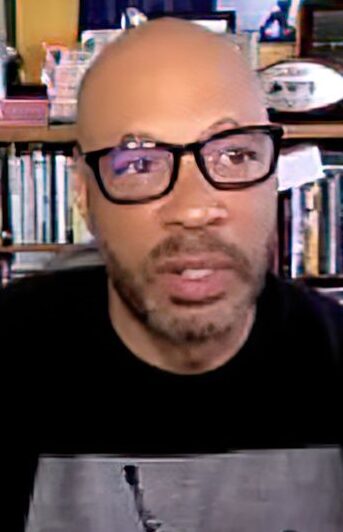 Jim Trotter (pictured, by Don Baker), the longtime pro football reporter whose contract with the NFL Media Group was not renewed after he publicly challenged NFL commissioner Roger Goodell on the NFL’s lack of diversity, is joining The Athletic next month as a national columnist. The New York Times, which ownsThe Athletic, made the announcement Wednesday.
Jim Trotter (pictured, by Don Baker), the longtime pro football reporter whose contract with the NFL Media Group was not renewed after he publicly challenged NFL commissioner Roger Goodell on the NFL’s lack of diversity, is joining The Athletic next month as a national columnist. The New York Times, which ownsThe Athletic, made the announcement Wednesday.
“Trotter brings a strong voice, fearless reporting and decades of experience covering the N.F.L. He has worked as a columnist and reporter for N.F.L. Media, a national N.F.L. reporter for ESPN, a senior writer for Sports Illustrated, and an N.F.L. beat writer and columnist for The San Diego Union-Tribune. He’s written two books, including ‘Junior Seau: The Life and Death of a Football Icon,’ and has been a Pro Football Hall of Fame voter since 2007,” the Times said.
“Trotter will work for The Athletic’s new Opinion desk and report to Deputy Managing Editor Jorge Rojas. He will continue to report on the N.F.L., while also writing columns on other sports and topics. . . .”
McCarter Named Interim Top Editor at USA Today
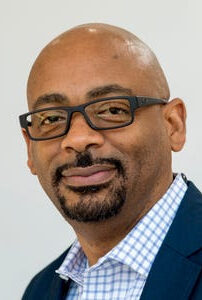 Michael McCarter (pictured), managing editor of standards and ethics and Opinion at USA Today, has added interim editor-in-chief to his portfolio as the news operation searches for a successor to Nicole Carroll, who plans to step down May 1 after leading USA Today for more than five years.
Michael McCarter (pictured), managing editor of standards and ethics and Opinion at USA Today, has added interim editor-in-chief to his portfolio as the news operation searches for a successor to Nicole Carroll, who plans to step down May 1 after leading USA Today for more than five years.
“Carroll, who is also Gannett’s President of News, championed greater diversity, equity and inclusion at USA TODAY. Under her leadership, USA TODAY hired more journalists of color and in 2020 announced plans to add or reassign journalists to 20 new beats to expand coverage of inequities in the U.S.,” Bailey Schulz wrote Monday, updated Tuesday, for the newspaper.
USA Today named McCarter managing editor of standards, ethics and inclusion in 2020. He was executive editor of the Evansville (Ind.) Courier & Press and coordinated coverage with editors and reporters across Indiana and Kentucky for the USA Today Network.
Longtime Journal-isms readers might remember an item from 2015 about the use of mugshots, when, in Cincinnati, many national news outlets juxtaposed an image of white murder suspect Ray Tensing, a University of Cincinnati police officer, with his Black shooting victim, Samuel DuBose. Tensing was in front of a flag, while DuBose was shown smiling in a police mugshot.
That didn’t happen at the Cincinnati Enquirer. McCarter, interim editor then and with a photojournalism background, told Journal-isms at the time, “A conversation did take place in our newsroom . . . I, along with a few of our editors, made the decision to NOT use a booking mug. It was irrelevant to this story and DuBose was the victim. You have to understand the power of images in situations like this.”
Hair to Head Byron Allen’s TV Station Division
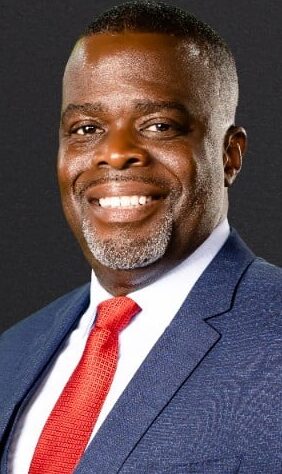 Media entrepreneur Byron Allen’s “Allen Media Group has hired Princell Hair (pictured) to be president of Allen Media Broadcasting – the company’s television station division consisting of 27 ABC, NBC, CBS and Fox affiliates in 21 markets nationwide,” TVNewsCheck reported Monday.
Media entrepreneur Byron Allen’s “Allen Media Group has hired Princell Hair (pictured) to be president of Allen Media Broadcasting – the company’s television station division consisting of 27 ABC, NBC, CBS and Fox affiliates in 21 markets nationwide,” TVNewsCheck reported Monday.
“Hair will also hold the title of executive vice president of the parent company, Allen Media Group, which comprises Weather Group and platforms including The Weather Channel, theGrio, HBCU GO, Sports.TV, JusticeCentral.TV, and the free-streaming app Local Now. Hair will be based at the Allen Media Studios/Weather Group campus in Atlanta.
“Hair comes to Allen Media Group from his previous two-year position as president of Black News Channel, which Allen purchased in 2022 and immediately re-branded as TheGrio Television Network. Prior to Black News Channel, Hair was senior vice president and general manager of NBC Sports Boston where he strengthened relationships with the Boston Celtics, New England Patriots, the Major League Soccer franchise The New England Revolution, and the WNBA franchise The Connecticut Sun. . . .”
The Grio quoted Hair as saying: “Local news matters, and the connections these local stations have in their communities cannot be overstated. The owned-and-operated Allen Media stations are a strong broadcast group in growing markets. I am excited to lead this team of accomplished general managers as we navigate the complexities of local television management while acquiring more broadcast stations and media assets.”
In 2021, a year before Black News Channel shut down operations, filed for bankruptcy protection, and was sold to Allen’s company, Journal-isms reported that “Black News Channel is in such turmoil that, in Hair’s words, management has ‘engaged a team of independent consultants to help our leadership team better understand the complexities of our workplace environment.‘ “
That year, two terminated employees filed a class-action suit in Cook County (Ill.) Circuit Court claiming gender discrimination (scroll down). Sheryl Weikal (formerly known as Sheryl Ring), attorney for the women, told Journal-isms on Tuesday, “Unfortunately, the bankruptcy and sale meant we were unable to move forward with the case.”

Marginalized Groups See ‘Palpable Harm’ by Media
Data from 41 focus groups of marginalized people in four countries, including the United States, shows that “many held a deep suspicion about the motives of news organisations they assumed manipulated the public for commercial or political aims; and audiences frequently attributed their distrust to what they saw as chronic bias in reporting that purported to be fair and impartial,” the British-based Reuters Institute’s Trust in News Project reported Tuesday.
“However, among focus group participants, these ideas were often rooted in perspectives that come from identifying as part of a group that is marginalised or situated far from the centres of power. In other words, the critiques may resonate as similar, but the stakes were often higher. Privileged audiences may be concerned about, say, sensationalism, but they rarely pay a personal price. Disadvantaged communities do.
“The lens through which many saw the failings of the news media in their countries was in large part (although not only) related to problems they saw in how people like them were portrayed in the media. And while some groups articulated complaints in similar ways as other audiences when it came to concerns about misrepresentation, underrepresentation, and perceived inaccuracies in coverage, the examples they offered often made clear the extent to which frustrations with news were not simply reasons to distrust it, but sources of palpable harm to communities already disadvantaged in society.
“Such perceptions and experiences inevitably shaped peoples’ sense of trust, but often in nuanced ways.”
The report also said, “In Brazil, we focused on Black and mixed-race audiences (people who identified as either preto or pardo); in India, we focused on audiences from marginalised castes or tribes and Muslim audiences; in the UK we focused on working-class audiences, and in the US we focused on Black and rural audiences. . . .”

Warnings on Abuse of Child Migrants Ignored
“Over the past two years, more than 250,000 migrant children have come alone to the United States,” Hannah Dreier reported Monday for The New York Times. “Thousands of children have ended up in punishing jobs across the country — working overnight in slaughterhouses, replacing roofs, operating machinery in factories — all in violation of child labor laws, a recent Times investigation showed. After the article’s publication in February, the White House announced policy changes and a crackdown on companies that hire children.
“But all along, there were signs of the explosive growth of this labor force and warnings that the Biden administration ignored or missed, The Times has found.
“Again and again, veteran government staffers and outside contractors told the Health and Human Services Department, including in reports that reached Secretary Xavier Becerra, that children appeared to be at risk. The Labor Department put out news releases noting an increase in child labor. Senior White House aides were shown evidence of exploitation, such as clusters of migrant children who had been found working with industrial equipment or caustic chemicals. . . .”
- Terry H. Schwardron, DC Report: Finally Addressing Migrant Child Labor in America (March 1)
(Credit: Associated Press/YouTube)
A.P. Reporting Traces Africans From Hope to Death
“Around 6:30 a.m. on May 28, 2021, a couple of miles from Belle Garden Beach on the Caribbean island of Tobago, a narrow white-and-blue boat drifted onto the horizon,” the Associated Press’ Renata Brito and Felipe Dana reported April 17 from the island.
“As it wobbled back and forth, fish gathered, feeding on the barnacles that had grown below the surface.
“From a distance, it seemed no one was aboard. But as fishermen approached, they smelled death.
“Inside were the decomposing bodies of more than a dozen Black men. No one knew where they were from, what brought them there, why they were aboard — and how or why they died. No one knew their names.
“What is clear now, but wasn’t then, is this:
“135 days earlier, 43 people were believed to have left a port city across the ocean in Africa.
“They were trying to reach Spain’s Canary Islands, off Africa’s northwest coast.
“They never arrived.
“Instead, they ended up here, on the other side of the Atlantic.
“Half a world away, their families were looking for them.”For nearly two years, The Associated Press assembled puzzle pieces from across three continents to uncover the story of this boat — and the people it carried from hope to death.
“The vessel that reached Tobago was registered in Mauritania, a large and mostly deserted country in northwest Africa nearly 3,000 miles (4,800 km) away. Evidence found on the boat — and its style and color as a typical Mauritanian ‘pirogue’ — suggested the dead were likely African migrants who were trying to reach Europe but got lost in the Atlantic.
“In 2021, at least seven boats appearing to be from northwest Africa washed up in the Caribbean and in Brazil. All carried dead bodies.
“These ‘ghost boats’ — and likely many others that have vanished — are in part an unintended result of years of efforts and billions of dollars spent by Europe to stop crossings on the Mediterranean Sea. That crackdown, along with other factors such as economic disruption from the pandemic, pushed migrants to return to the far longer, more obscure and more dangerous Atlantic route to Europe from northwest Africa via the Canaries instead. . . .”
- David Ehl, Deutsche Welle: More than mercenaries: Russia’s Wagner Group in Africa
- DaQuan Lawrence, Afro, Baltimore: IBW 21st Century Announces State of the Black World Conference V in Baltimore (Jan. 11)
- John Yang and Andrew Corkery, “PBS News Weekend”: Journalists retrace fateful journey of group of 43 African migrants lost at sea (video and transcript)
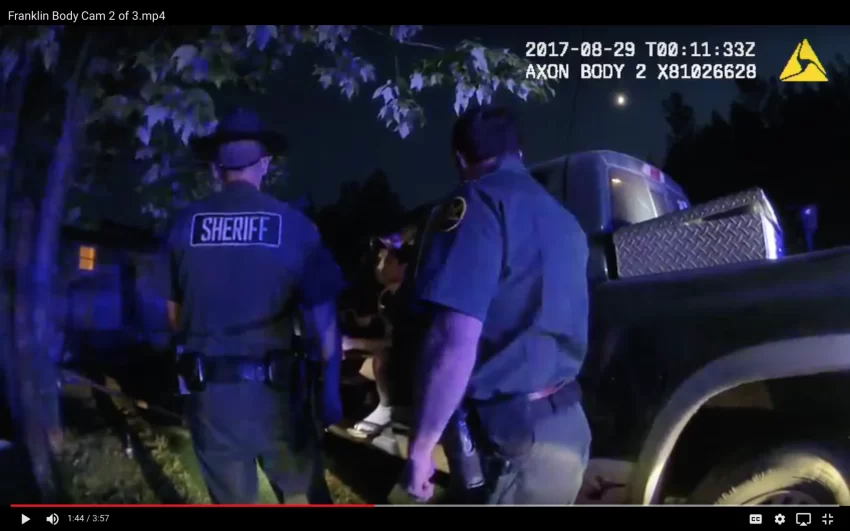
Spanish Speakers Victimized by Faulty Translations
“Senior prosecutors in one of New York’s largest counties have known for years that drunk driving convictions of Spanish-speaking motorists may have been tainted by faulty evidence,” Brett Murphy reported Monday for ProPublica, in a story co-published with El Diario. “But the Westchester District Attorney’s Office failed to investigate until defense attorneys contacted the unit that reviews wrongful convictions.
“From at least 2014 to 2018, records show, New York State Police troopers gave some drivers mistranslated instructions about what it means to refuse a blood alcohol test. Legal experts, including three former prosecutors in Westchester, told ProPublica that those incorrect directions could, at a minimum, confuse or mislead drivers and may have pressured some into a decision that resulted in severe consequences.
“Westchester prosecutors were alerted to the issue at least three times, in 2018, 2019 and 2021, records show. . . .
“When a driver suspected of being drunk refuses a chemical test for alcohol in their system, police in New York, like in many other places, are required by law to explain that the motorist’s license will be suspended, whether or not they are found guilty, and that their refusal can be used as evidence against them. A chemical test typically measures blood alcohol content in someone’s breath, blood or urine.
“But some state police troopers in Westchester told Spanish-speaking drivers something different. Officers in Troop K gave those motorists a sheet of paper that described a refusal as tantamount to being found guilty for driving drunk. It told drivers that authorities ‘will punish you as being guilty’ for not taking the test — which is a significant departure from the actual law, which only states the refusal can be used as evidence against them. The warning also falsely stated that officers ‘are going to examine your blood,’ instead of requesting that drivers take the test, which is often a Breathalyzer.
“ProPublica consulted with Spanish-language and legal authorities at five universities, who said the mistranslated warning had several deeply flawed passages. . . .”
Juadine Henderson gives an oral history to Emilye Crosby in 2015, for the Library of Congress and the Smithsonian Museum of African American History and Culture. (Credit:YouTube)
Juadine Henderson Dies; SNCC Worker, Journalist
Juadine Henderson, a worker for the Student Nonviolent Coordinating Committee during the civil rights movement who became an editor for the Oakland Tribune and USA Today, died Sunday at her Oxon Hill, Md., home in suburban Washington, a day after her 76th birthday.
Carla D. Brown, a niece, would not specify the cause of death, but said it was by “natural causes” and “there were no pre-existing health issues.”
SNCC prepared a chronology of Henderson’s life. It began, “Batesville, Mississippi-native Juadine Henderson was just 15-years-old in 1963 when she went to Greenwood, Mississippi for a SNCC-led voter registration workshop. Before doing that she had first met SNCC field secretary Frank Smith in her hometown.
“ ‘He’s a Freedom Rider,’ explained her cousin, a student at nearby Rust College in Holly Springs where Smith was based. He had brought Frank home for Thanksgiving. A few months later, Smith came back to Batesville to see if Henderson and her friends wanted to come to Greenwood for a voter registration workshop. ‘I had no idea what a workshop was,’ she recalled, but ‘if this has to do with the Freedom Rides, then I want to go because we have things to do in Batesville.’
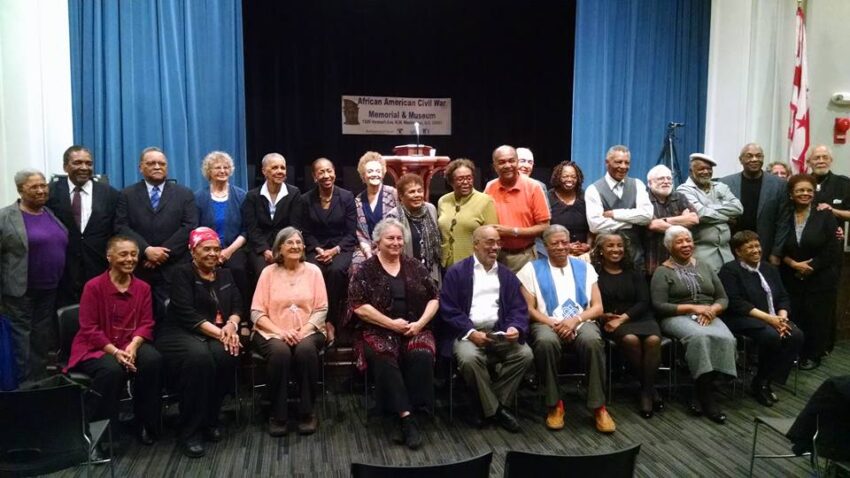
Standing from left: Juadine Henderson, Frank Smith, Topper Carew, Penny Patch, Freddie Green Biddle, Jennifer Lawson, Kathy Cleaver, Julia Prettyman, Joyce Ladner, Dion Diamond, Bob Zellner, Rutha Harris, Chuck Neblett, Bill Perlman, Emory Harris, Courtland Cox, Shirley Wright Cooks, Jean Wheeler Smith Young, Michael Thelwell. (Credit: SNCC Legacy Project)
“After arriving in Greenwood, Henderson was struck by how young and engaged everyone in the SNCC office was. ‘Who are these people?’ she thought. They looked at the world differently than other people she had encountered. ‘It made you think about what you were doing and what you were saying and why you believed what you were believing,’ she recalled.
“Medgar Evers was murdered on her first night in Greenwood, and the next morning, SNCC staffers tasked Henderson and her friends with passing out leaflets for a mass meeting. She didn’t know what a mass meeting was but was awed when more Black people than she had ever seen packed into the church that night. The singing and spirit amazed her. . . . .
“The rest of the week’s workshop taught Henderson that if Black people had the right to vote they could change all kinds of things in their lives. . . .
“After leaving the Movement to enroll in college, Henderson came back to Batesville and half-heartedly started organizing with the SCLC’s [Southern Christian Leadership Conference’s] Poor People’s Campaign. By that point, ‘I no longer believed that the whole system of government was going to change because three people in Mississippi are now voting,’ she explained. ‘I didn’t think that the federal government was on our side anymore.’ Her work with SCLC eventually brought her to Resurrection City in Washington, D.C. She felt like a hypocrite, staying in the clean hotel with SCLC staffers at night and handing out peanut butter and jelly sandwiches to poor people in muddy tents during the day. . . .”
In 1974, Henderson left D.C. to participate in Summer Program for Minority Journalists at Columbia University, a precursor to the Maynard Institute for Journalism Education. Henderson worked for Gannett’s Daily Argus in Mount Vernon, N.Y., the Oakland (Calif.) Tribune, and USA Today in Washington.
Eric Newton, then an editor at the Tribune, messaged Journal-isms, “One of her jobs at the Trib was assistant city editor. Like all the best, she could remain pleasant and calm in the midst of chaos. Those were the days before the web, when we used RadioShack laptops that sent stories over phone lines only with great difficulty. No matter how many times you had to resend garbled stories, and no matter . . . how close you were to deadline, she was cool under pressure, a real pro. She could rise above it.”
Lee Ivory, a colleague at her last newspaper stop, where she worked on the Page One and rewrite desks, among others, wrote on Facebook, “She was a steadying force at USA TODAY and we all were crazy about her!”
The family obituary added, “Her final employment was The African American Civil War Museum where she was able to share her passion for Civil Rights and History.” Smith, the SNCC field secretary Henderson met in her hometown, laid the groundwork for the museum and is its executive director.
“To honor the expressed wishes of Juadine, she will be cremated and a memorial service will be scheduled in Mississippi at a later date,” the family obituary said.
Short Takes
- “Publishers are slowly publicly releasing the latest reports on the diversity of their workforces. And while Condé Nast, Hearst, The New York Times, Vice Media Group and Vox Media diversified their companies’ staffs compared to the year prior, they are still primarily hiring white people,” Sarah Guaglione reported Tuesday for Digiday. See a running tracker of these reports released last week here.
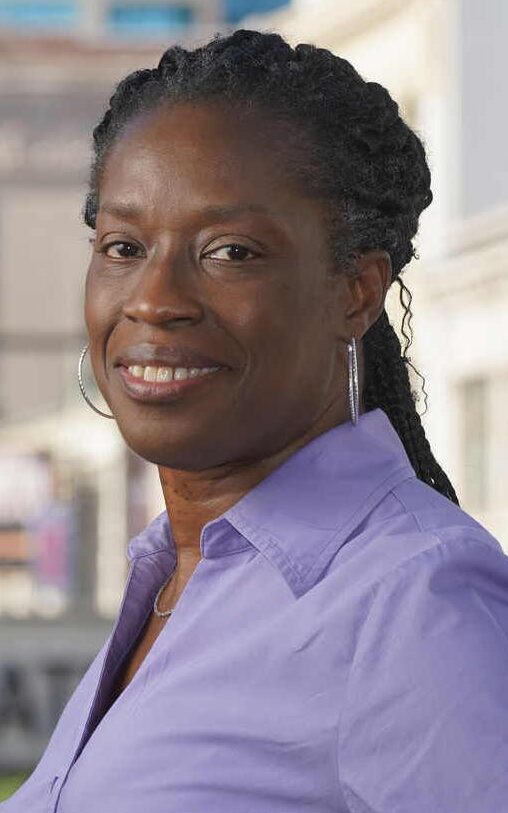 Last July, Sheila Rayam (pictured) became the first Black journalist to lead the newsroom of The Buffalo News. But, Angela Fu wrote Thursday for the Poynter Institute, Rayam walked into a newspaper targeted for substantial cuts by owner Lee Enterprises, resulting in low morale. “Amid all of the cuts, employees grappled with shorted paychecks and large out-of-pocket expenses for routine health care, issues that arose when the company changed payroll administration and insurance providers,” Fu wrote. “As part of the budget cuts, the News has paused hiring. One of the openings affected is a new equity and culture reporter position, which had been a priority for executive editor Rayam, especially given the May 14 shooting,” in which a white supremacist killed 10 Black people at a supermarket. “Now, the position will go unfilled. . . . Rayam has been working to reorganize the newsroom to accommodate the cuts and has told journalists that they will need to be ready to prioritize some coverage areas while letting others go,” said newsroom veteran Mark Sommer. “Accepting that has been difficult.”
Last July, Sheila Rayam (pictured) became the first Black journalist to lead the newsroom of The Buffalo News. But, Angela Fu wrote Thursday for the Poynter Institute, Rayam walked into a newspaper targeted for substantial cuts by owner Lee Enterprises, resulting in low morale. “Amid all of the cuts, employees grappled with shorted paychecks and large out-of-pocket expenses for routine health care, issues that arose when the company changed payroll administration and insurance providers,” Fu wrote. “As part of the budget cuts, the News has paused hiring. One of the openings affected is a new equity and culture reporter position, which had been a priority for executive editor Rayam, especially given the May 14 shooting,” in which a white supremacist killed 10 Black people at a supermarket. “Now, the position will go unfilled. . . . Rayam has been working to reorganize the newsroom to accommodate the cuts and has told journalists that they will need to be ready to prioritize some coverage areas while letting others go,” said newsroom veteran Mark Sommer. “Accepting that has been difficult.”
- An academic paper by Meredith D. Clark, Ph.D. and Tracie M. Powell, founder of the Pivot Fund, analyzes data from 100 BIPOC (Black, Indigenous and People of Color) news media founders and publishers. “Seventy-nine percent of BIPOC-founded news organizations that responded to our survey stated that current funders are not meeting their primary needs. Most cite the lack of direct, substantial funding that is not tied to burdensome reporting or training requirements.” They add, “Some of the more pointed critiques came from individuals who had previous experience in journalism, and found requirements to participate in training as a condition of receiving funding paternalistic. . . .”
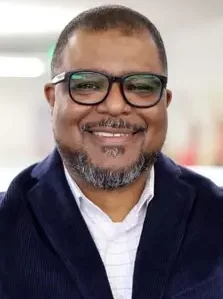 “Make sure you keep digging, make sure you’re grounded in your communities and understand policing,” said Leroy Chapman Jr. (pictured), the Atlanta Journal-Constitution’s editor in chief, quoted in an Editor & Publisher story Wednesday headlined, “Covering violence and policing in a preventative (not reactive) way.” “In dissecting how it happens, you get to, ‘What can we do better? What are the elements that lead to this sort of tension?’ ” Alyssa Choiniere added, “He said that covering policing requires an understanding of how the job works. ‘Ground yourself into the process of policing because, most of the time, it’s difficult,’ he said. ‘It’s layered and complex, and the more you understand about it, the more questions you can ask where wrong information won’t get out, and you can pressure test what police say as an official account, as well.’ ”
“Make sure you keep digging, make sure you’re grounded in your communities and understand policing,” said Leroy Chapman Jr. (pictured), the Atlanta Journal-Constitution’s editor in chief, quoted in an Editor & Publisher story Wednesday headlined, “Covering violence and policing in a preventative (not reactive) way.” “In dissecting how it happens, you get to, ‘What can we do better? What are the elements that lead to this sort of tension?’ ” Alyssa Choiniere added, “He said that covering policing requires an understanding of how the job works. ‘Ground yourself into the process of policing because, most of the time, it’s difficult,’ he said. ‘It’s layered and complex, and the more you understand about it, the more questions you can ask where wrong information won’t get out, and you can pressure test what police say as an official account, as well.’ ”
- Viewers of the “PBS NewsHour” are noticing changes in tone under new co-anchors Geoff Bennett, a Black journalist, and Amna Nawaz, a Pakistani American. The latest example is a Nawaz interview this week with former Israeli Prime Minister Naftali Bennett, in which Nawaz repeatedly questioned the Israeli on treatment of Palestinians. In March, Geoff Bennett’s interview with retired Army Col. Paris Davis, a Black veteran awarded a long-delayed Medal of Honor, the U.S. military’s most prestigious decoration, was a model of empathy.
- “An Oklahoma county commissioner allegedly heard on a recording of local officials that included remarks about lynching Black people and killing journalists has resigned,” Rosa Flores reported Thursday for CNN. Flores also wrote, “The McCurtain Gazette-News over the weekend published the audio it said was recorded following a Board of Commissioners meeting on March 6. The paper said the audio of the meeting was legally obtained, but the McCurtain County Sheriff’s Office said in a statement that it was illegally recorded and is investigating. The sheriff’s office also said it believes the recording had been altered. . . .”
- “The smell of financial corruption around Thomas is now stronger than the longstanding fear that his votes on the high court are dictated by his hatred of the liberals who put him through [a] painful nomination hearing dominated by Anita Hill’s charges of sexual harassment,” Fox analyst Juan Williams wrote for The Hill Monday about his friend, Supreme Court Justice Clarence Thomas. “The smell of financial favors is also now stronger than puzzlement about Thomas’s unyielding loyalty to a hardline Republican agenda that made former President [Donald] Trump call Thomas his favorite justice. . . . I’ve known him for 40 years — and for most of that time, during which I wrote news columns and magazine stories about him, we also became friends. He has always been gracious to my children, as a guest in my home and even at my birthday party. . . .”
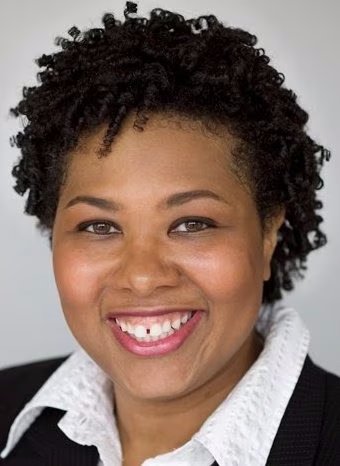 In Philadelphia, WHYY News announced April 11 that Jamila Bey (pictured) has been hired as editorial director. Bey is responsible for managing the news editorial content across platforms including the website, radio, programming, podcast, and digital media. Sarah Glover, vice president of news and civic dialogue, “revamped the former news director position to an editorial director role, updating the newsroom leadership structure to one that cultivates and prioritizes an emphasis on impactful storytelling across broadcast and digital platforms,” an announcement said.
In Philadelphia, WHYY News announced April 11 that Jamila Bey (pictured) has been hired as editorial director. Bey is responsible for managing the news editorial content across platforms including the website, radio, programming, podcast, and digital media. Sarah Glover, vice president of news and civic dialogue, “revamped the former news director position to an editorial director role, updating the newsroom leadership structure to one that cultivates and prioritizes an emphasis on impactful storytelling across broadcast and digital platforms,” an announcement said.

- “The New York Times is not alone,” climate reporter Kendra Pierre-Louis wrote about COVID-19 April 12 for Nieman Reports. “Outlets like The New Yorker, The Washington Post, and NPR, to name just a few, have amplified voices and arguments that helped create a narrative that not only pathologizes those who remain cautious about the disease, but also fails to adequately convey the risks associated with Covid such that many people are unwittingly taking on potentially lifelong risks. In the process, we’ve failed at our field’s core tenets — to hold power to account and to follow the evidence. Our failures here could last a generation. . . . “
- “In a first-time collaboration, ABC News and The Associated Press announced a documentary that takes viewers inside the Ku Klux Klan,” TVNewsCheck reported Thursday. “Based on an award-winning investigative AP series, the true-crime documentary captures the infiltration of the klan in northern Florida by a former Army infantryman named Joe Moore and includes exclusive new interviews with the FBI agents who oversaw the operation and exposes systemic corruption.” “Grand Knighthawk: Infiltrating the KKK,” produced by ABC News’ George Stephanopoulos, premieres April 27 on Hulu.
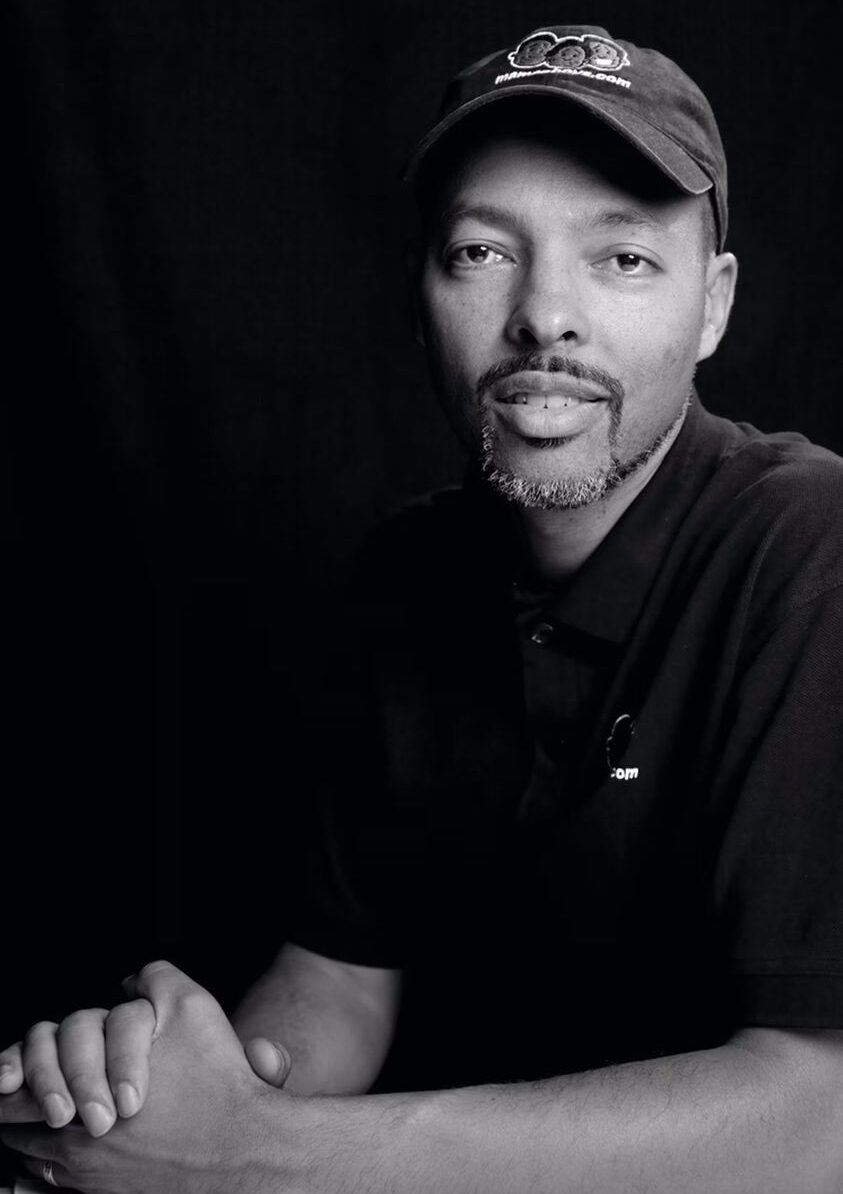 Cartoonist Jerry Craft (pictured) and his work have “joined the hundreds of other pieces challenged each year as potentially inappropriate amid the current culture wars,” Michael Cavna wrote April 8 in the Washington Post. “Craft says he would have preferred to receive attention for simply drawing a book that students have embraced. Instead, he and his titles” — including “School Trip,” his follow-up to the popular “New Kid, “released this month — “have gained enough attention that by Thursday, he was a guest on Comedy Central’s ‘The Daily Show,’ on which he emphasized that the term ‘graphic novel’ does not mean a novel with graphic content. . . . Craft anticipates facing some heat as he goes on tour this month to promote ‘School Trip,’ the third book in the New Kid series. Yet he says the strong response from schoolchildren — some of them reluctant readers who are drawn to Craft’s textured mix of prose and pictures — inspires him to keep creating books and making visits. . . .”
Cartoonist Jerry Craft (pictured) and his work have “joined the hundreds of other pieces challenged each year as potentially inappropriate amid the current culture wars,” Michael Cavna wrote April 8 in the Washington Post. “Craft says he would have preferred to receive attention for simply drawing a book that students have embraced. Instead, he and his titles” — including “School Trip,” his follow-up to the popular “New Kid, “released this month — “have gained enough attention that by Thursday, he was a guest on Comedy Central’s ‘The Daily Show,’ on which he emphasized that the term ‘graphic novel’ does not mean a novel with graphic content. . . . Craft anticipates facing some heat as he goes on tour this month to promote ‘School Trip,’ the third book in the New Kid series. Yet he says the strong response from schoolchildren — some of them reluctant readers who are drawn to Craft’s textured mix of prose and pictures — inspires him to keep creating books and making visits. . . .”
- ” ‘ABC World News Tonight’ anchor David Muir and his team traveled to South Sudan to report on yet another front line of the climate crisis, with more than 1 million people now facing severe food insecurity due to the worst floods here since the 1960s, according to the United Nations,” Esther Castillejo reported Wednesday for ABC News. “They joined humanitarian workers from the World Food Programme as they race against time to bring necessary supplies — and food — to support the hundreds of thousands of people displaced by both conflict and climate in the town of Bentiu. So many here have been cut off by the water, forced to rely on canoes or wade through the high waters in search of food, shelter and medicine.”
- “Black viewers are viewing free ad-supported streaming TV (FAST) and subscription video-on-demand services in numbers well above the overall consumer average, according to a new Horowitz Research study,” R. Thomas Umstead reported Tuesday for Multichannel News. “More than 80% of Blacks have used a free OTT service over the past month, up from 13% from 2019 and compared to 69% for consumers overall, according to the Horowitz Focus Black Volume 1: Subscriptions survey. . . .”

- For the past six months, 30 journalists have come together to pursue the work of assassinated Colombian journalist Rafael Moreno. in keeping with requests he made before his death,” Paloma Dupont de Dinechin wrote for the Rafael Project, published by Forbidden Stories. “Several days before his assassination, Moreno had been in contact with Forbidden Stories with the aim of joining the Safebox Network, which allows threatened journalists to upload and protect their sensitive information. If something happens to them, Forbidden Stories and our network of partners can pursue their work and ensure that their stories are read by a maximum number of people around the world. .. . Today, we are publishing these investigations alongside 32 media partners around the world. . . .”
To subscribe at no cost, please send an email to journal-isms+subscribe@groups.io and say who you are.
Facebook users: “Like” “Richard Prince’s Journal-isms” on Facebook.
Follow Richard Prince on Twitter @princeeditor
Richard Prince’s Journal-isms originates from Washington. It began in print before most of us knew what the internet was, and it would like to be referred to as a “column.” Any views expressed in the column are those of the person or organization quoted and not those of any other entity. Send tips, comments and concerns to Richard Prince at journal-isms+owner@
View previous columns (after Feb. 13, 2016).
View previous columns (before Feb. 13, 2016)
- Diversity’s Greatest Hits, 2018 (Jan. 4, 2019)
- Book Notes: Is Taking a Knee Really All That? (Dec. 20, 2018)
- Book Notes: Challenging ’45’ and Proudly Telling the Story (Dec. 18, 2018)
- Book Notes: Get Down With the Legends! (Dec. 11, 2018)
- Journalist Richard Prince w/Joe Madison (Sirius XM, April 18, 2018) (podcast)
- Richard Prince (journalist) (Wikipedia entry)
- February 2018 Podcast: Richard “Dick” Prince on the need for newsroom diversity (Gabriel Greschler, Student Press Law Center, Feb. 26, 2018)
- Diversity’s Greatest Hits, 2017 — Where Will They Take Us in the Year Ahead?
- Book Notes: Best Sellers, Uncovered Treasures, Overlooked History (Dec. 19, 2017)
- An advocate for diversity in the media is still pressing for representation, (Courtland Milloy, Washington Post, Nov. 28, 2017)
- Morgan Global Journalism Review: Journal-isms Journeys On (Aug. 31, 2017)
- Diversity’s Greatest Hits, 2016
- Book Notes: 16 Writers Dish About ‘Chelle,’ the First Lady
- Book Notes: From Coretta to Barack, and in Search of the Godfather
- Journal-isms’ Richard Prince Wants Your Ideas (FishbowlDC, Feb. 26, 2016)
- “JOURNAL-ISMS” IS LATEST TO BEAR BRUNT OF INDUSTRY’S ECONOMIC WOES (Feb. 19, 2016)
- Richard Prince with Charlayne Hunter-Gault, “PBS NewsHour,” “What stagnant diversity means for America’s newsrooms” (Dec. 15, 2015)
- Book Notes: Journalists Follow Their Passions
- Book Notes: Journalists Who Rocked Their World
- Book Notes: Hands Up! Read This!
- Book Notes: New Cosby Bio Looks Like a Best-Seller
- Journo-diversity advocate turns attention to Ezra Klein project (Erik Wemple, Washington Post, March 5, 2014)

